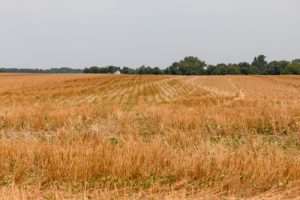
U.S. Rep. Rodney Davis (R-IL) recently introduced legislation that aims to increase farm productivity in America and fight climate change by optimizing agriculture’s ability to sequester carbon and reduce net emissions.
“These practices will help reduce our carbon footprint while also increasing land productivity,” Rep. Davis said. “I look forward to working with my colleagues in Congress to identify and implement innovative solutions to reduce net emissions.”
The Naturally Offsetting Emissions by Managing and Implementing Tillage Strategies (NO EMITS) Act, H.R. 2508, was sponsored by Rep. Davis and has two Republican cosponsors including U.S. Rep. Don Bacon (R-NE). The legislation would provide incentives for producers to adopt soil health cropping systems, such as cover crops, and would authorize $100 million a year to states for soil health programs, according to a bill summary provided by Rep. Davis’ office.
“We can combat the negative effects of climate change without enacting job-killing energy policies or massive new government programs,” said Rep. Davis. “That’s why I’m proud to introduce the NO EMITS Act, which encourages farmers to adopt practices that promote good soil health, like the use of cover crops.”
Carbon sequestration in soil increases the amount of organic matter. Higher soil organic matter, which is about 60 percent carbon, means healthier soils that produce higher yields. Carbon-rich soils also support a larger population of soil microorganisms, which in turn, support many processes beneficial to plant growth, such as water retention, soil resilience, and pathogen resistance, according to Rep. Davis’ office, which noted that U.S. farmers have long recognized the benefits of managing soil health and many have voluntarily adopted practices to do so.
If enacted, H.R. 2508 would establish a Soil Health Transition Incentive Program that provides payments and technical assistance to producers who are transitioning their farms to soil health cropping systems; provide longer term contracts to help mitigate risk during transition to soil health cropping systems; and double funding for the Conservation Innovation Trials from $25 million to $50 million, among other provisions, according to the summary.
The bill, which has been endorsed by the Illinois Farm Bureau, is part of several pro-innovation agriculture bills addressing climate change introduced by Republican members in the U.S. House Agriculture Committee.
“I’m pleased to have Congressman Davis leading this effort to advocate for natural solutions for climate change,” said Glenn “GT” Thompson (R-PA), ranking member of the House Agriculture Committee.



